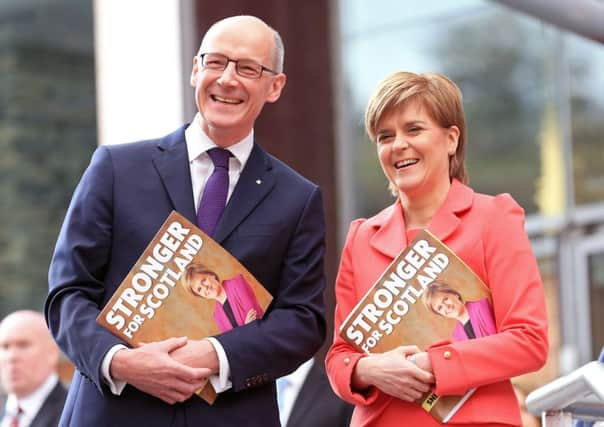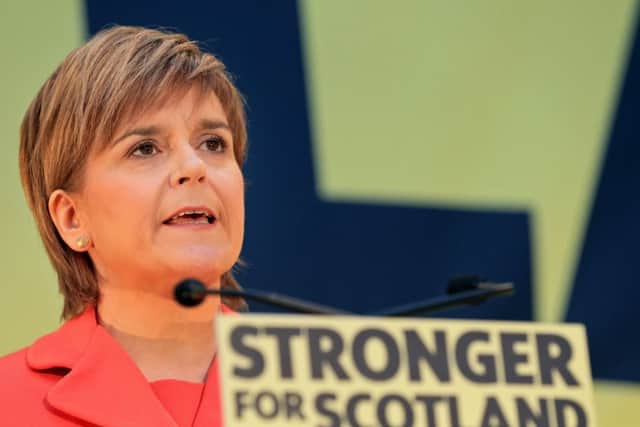Nicola Sturgeon’s home-rule would cost £10 billion


Analysis of the SNP manifesto by the Institute for Fiscal Studies (IFS) that the cost of Ms Sturgeon’s plans for full fiscal autonomy would grow to £9.7 billion by 2019/20 from the £7.6 billion already forecast for 2015/16.
The SNP’s proposal to campaign for the devolution of all tax and spending powers (or full fiscal autonomy) has become a key election issue.
Advertisement
Hide AdAdvertisement
Hide AdIn the SNP manifesto launched this week described full, fiscal autonomy as “full financial responsibility” and argued that it would take several years to reach the new constitutional settlement.


Labour has argued that moving to full fiscal autonomy would see the abolition of the Barnett Formula, the funding mechanism that sees Scotland receive £1,200 more per head from the Treasury than other parts of the UK.
Opposition attacks on full fiscal autonomy have also pointed out that such an arrangement would leave Scotland reliant on oil revenue at a time when the oil price has plummeted.
The SNP has countered Labour by claiming that more powers would give the Scottish Government the levers to grow the economy and shrink the fiscal gap.
The IFS, however, said: “The types of policies previously outlined by the SNP as potential ways to boost growth, such as cuts to corporation tax and air passenger duty, and increases in childcare spending, would, at least in the short to medium run, cost the government money, and widen rather than shrink the fiscal gap, even if they did boost growth.”
The IFS said Scotland’s deficit was projected to shrink from 8.6 per cent of GDP in 2015/16 to 4.6 per cent of GDP in 2019/20.
Even so, the IFS added, the gap between Scotland’s deficit and the UK as a whole would reach £9.7 billion in 2019/20.
The calculations were made on the basis of Scotland’s share of UK public spending remaining at 9.2 per cent; Scotland’s share of the UK’s oil and gas revenues remaining at 83.8 per cent; and Scotland’s onshore revenues-per-person remaining at 97 per cent.
Advertisement
Hide AdAdvertisement
Hide AdThe SNP’s opponents claimed the SNP’s proposal would sign Scotland up to massive spending cuts or punitive tax rises.
Scottish Labour Deputy Leader Kezia Dugdale said: “It’s no wonder the SNP have tried to hide the cost of their plan to cut Scotland off from UK-wide taxes, because the consequences of their reckless policy would be devastating. It would mean massive cuts in public spending for our NHS and schools, as well as an end to the UK-wide pension in Scotland.
“The experts at the IFS have confirmed what Labour said yesterday – the SNP’s manifesto means they have signed up to massive spending cuts that would make even the Tories blush. Each of the SNP’s claims has been demolished by the IFS.
“The SNP say we could delay implementing their own plan and that would make things better. The IFS say this isn’t true and would only make things worse.
“The SNP say we could grow our way out of the extra austerity caused by full fiscal responsibility. The IFS say we’d need heroic levels of growth for this to be even vaguely true.
“And the SNP say we’d have billions of pounds more in onshore taxes to close the gap in Scotland’s finances. The IFSsay they’ve already counted that and we’d still be nearly £10 billion a year in the red.”
The Scottish Conservative enterprise spokesman Murdo Fraser said: “The SNP is in full retreat on full fiscal autonomy – they have even tried to change its name to full fiscal responsibility, so embarrassed are they by it.
“The latest SNP stance on this changes by the hour and by the day, they still seem to want it but not for years.
Advertisement
Hide AdAdvertisement
Hide Ad“As the IFS has pointed out, full fiscal autonomy would create a black hole in our public finances – which would keep getting deeper.”
Mr Fraser added: “Whether this is a policy for now, tomorrow or five years from now, it would be a disaster for business and taxpayers.”
The Scottish Lib Dem leader Willie Rennie said: “The independent Institute of Fiscal Studies have crushed the headline SNP commitment before the ink was dry on their manifesto. If people vote SNP they are endorsing substantial tax rises or spending cuts for Scotland.”
The SNP responded by highlighting the figures suggesting that Scotland’s deficit would fall from 8.6 per cent of GDP to 4.6 per cent.
The SNP MP Kenny Gibson said: “The Westminster parties have spent most of this election trading in negativity, in a failed attempt to divert attention from the real cuts they are all proposing right now. Labour, the Tories and Lib Dems have had nothing positive to say about the Scotland’s future, or how we can achieve the strongest possible voice in the House of Commons with a team of SNP MPs. “These figures - showing Scotland’s deficit almost halving as a share of GDP by the end of the decade, without factoring in the measures we propose to boost the economy - underline that Scotland has robust finances. The Westminster parties are doing themselves no good by constantly talking down Scotland financial abilities.”